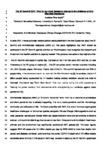The G7 Summit 2021: Time for our world leaders to step up to the challenge of Anti-Microbial Resistance
| dc.contributor.author | joshi, lovleen | |
| dc.date.accessioned | 2021-11-13T12:58:09Z | |
| dc.date.issued | 2021-12-14 | |
| dc.identifier.issn | 2516-8290 | |
| dc.identifier.issn | 2516-8290 | |
| dc.identifier.other | 000298 | |
| dc.identifier.uri | http://hdl.handle.net/10026.1/18348 | |
| dc.description.abstract |
In June 2021, I wrote a strongly worded opinion piece published in the New Statesman about the G7 Summit and antimicrobial resistance (AMR) [1]. The piece highlighted that AMR should be addressed in the G7 Summit agenda and that our world leaders must recognize that research and investment into feasible solutions are urgently needed. This personal view adds to that original article. The G7 Summit took place in Carbis Bay, Cornwall, UK on the 11–13 June 2021 and the UK took Presidency of the G7 group of nations [2]. The G7 comprises seven member countries, namely the UK, the USA, Canada, Japan, Germany, France and Italy, as well as the EU (a ‘non-enumerated member’). The summit represented over 60% of people living in the democratic world, i.e. over half the world’s economy [3]. In numbers, that is 2.2billion people being represented by 11 leaders making serious decisions around 1 table in Cornwall. The theme was Build Back Better. The main priority during the UK’s presidency is ‘leading the global recovery from coronavirus while strengthening our resilience against future pandemics’ [4]. | |
| dc.format.extent | 000298- | |
| dc.format.medium | Electronic-eCollection | |
| dc.language | en | |
| dc.language.iso | en | |
| dc.publisher | Microbiology Society | |
| dc.subject | COVID-19 | |
| dc.subject | G7 | |
| dc.subject | antimicrobial resistance | |
| dc.subject | climate change | |
| dc.subject | pandemic | |
| dc.subject | policy | |
| dc.title | The G7 Summit 2021: Time for our world leaders to step up to the challenge of Anti-Microbial Resistance | |
| dc.type | journal-article | |
| dc.type | Journal Article | |
| plymouth.author-url | https://www.ncbi.nlm.nih.gov/pubmed/35024558 | |
| plymouth.issue | 12 | |
| plymouth.volume | 3 | |
| plymouth.publication-status | Published | |
| plymouth.journal | Access Microbiology | |
| dc.identifier.doi | 10.1099/acmi.0.000298 | |
| plymouth.organisational-group | /Plymouth | |
| plymouth.organisational-group | /Plymouth/Faculty of Health | |
| plymouth.organisational-group | /Plymouth/REF 2021 Researchers by UoA | |
| plymouth.organisational-group | /Plymouth/REF 2021 Researchers by UoA/UoA01 Clinical Medicine | |
| plymouth.organisational-group | /Plymouth/Users by role | |
| plymouth.organisational-group | /Plymouth/Users by role/Academics | |
| dc.publisher.place | England | |
| dcterms.dateAccepted | 2021-11-03 | |
| dc.rights.embargodate | 2021-12-18 | |
| dc.identifier.eissn | 2516-8290 | |
| dc.rights.embargoperiod | Not known | |
| rioxxterms.versionofrecord | 10.1099/acmi.0.000298 | |
| rioxxterms.licenseref.uri | http://www.rioxx.net/licenses/all-rights-reserved | |
| rioxxterms.licenseref.startdate | 2021-12-14 | |
| rioxxterms.type | Journal Article/Review |


